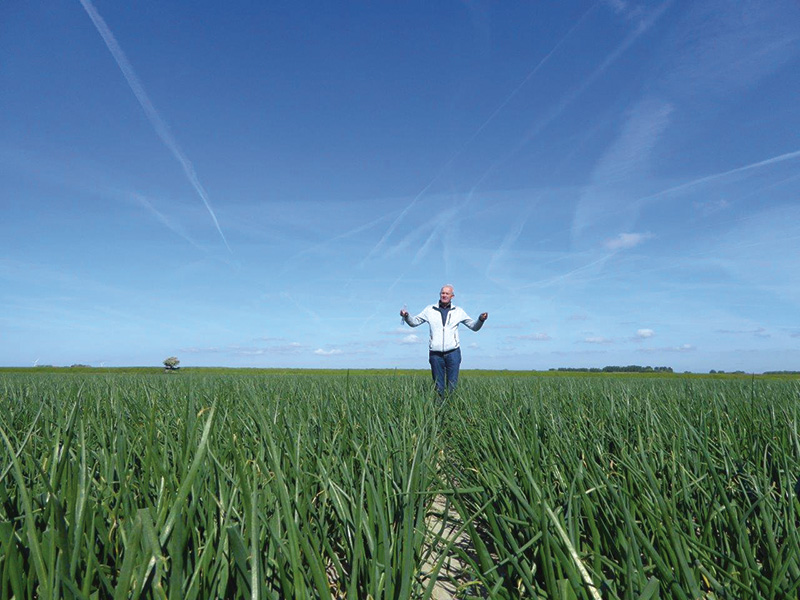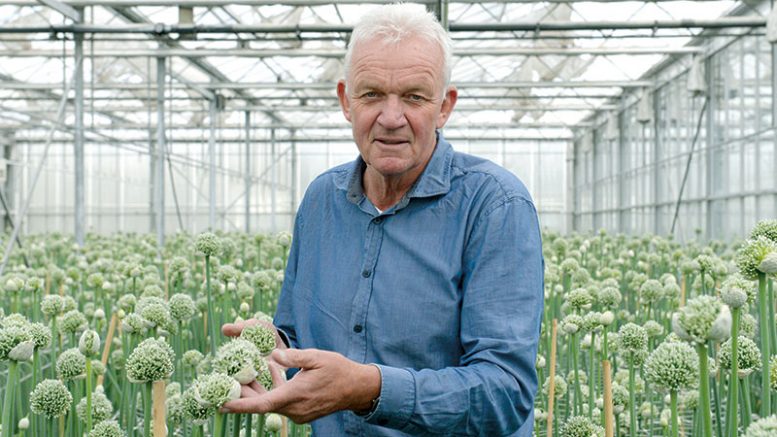Bejo Zaden and De Groot en Slot are two family-owned, independent businesses that have been collaborating for 50 years to breed and sell onion seeds.
Jan Slot has been an onion breeder for 35 years. His family owns De Groot en Slot. He grew up in the Netherlands and studied at Wageningen University. Slot has seen a lot of changes in the industry during his career and has accrued wisdom that only a lifetime of work can bring. Just after he announced his retirement, Onion World took an opportunity to sit down and visit with Slot.
Q: Tell us about your career. How long have you been in the industry?
A: A pretty long time. I started in 1973 at our family-owned company in the Netherlands. Then I got more involved in the breeding and selecting, especially in the alliums of onions, garlic and shallots. And now for more than 35 years, I am a breeder in the alliums.
Q: You have been personally involved in the breeding of a lot of very successful varieties, including Copra, Tamara, Gunnison, Daytona, Crockett and, of course, Redwing. These are all long-day varieties, right?
A: Indeed, these are all long-day varieties. They all have a good combination of yield, maturity and long storage quality. Growers can sell them 10 months to a year. Those varieties were and are very popular in the northern states of the USA, especially in Washington and New York.
Q: Which of those varieties are you most proud of?
A: For sure, Redwing for the reds, the first deep red variety with a nice shape and good storability. And for the yellows – because in the yellows, you have much more competition – I think it will be Crockett. Crockett is a very nice brown, globe-shaped onion with very good storage.
Q: In the breeding process, how do you determine what traits you’re going to try to breed for?
A: In the beginning, you’re always looking at what the market wants and what will be the future. The most important thing is what will be the future in the onion business. In the past, it was, of course, always a strong focus on yield. But then more challenges came up. For instance, it became important to look for storage quality. Now you are also busy with getting varieties that are stronger or even resistant against diseases.
Q: What’s the status of varieties right now with resistance to thrips and Iris yellow spot virus?
A: Those are, in principle, one of the most difficult ones. Thrips is a really dangerous insect, especially when you have varieties with waxy foliage. When you have less waxy foliage, the thrips slide off easier from the foliage in contrast of waxy foliage which acts like a gum. That causes a lot of damage on the plant. Iris yellow spot virus is still a rather new disease in onions. We are working on it, but it is still in the beginning.
Q: So is it too soon to say what’s coming around for it?
A: For that disease, it is too soon to say. What we have achieved already is resistance against downy mildew. Fusarium is also a disease we are really focusing on.
Q: And you have some varieties coming specifically for those diseases?
A: With downy mildew, we even have varieties like Powell that are completely 100 percent resistant, but until now, they are more for the north part of the USA. Fusarium takes longer, but nowadays we have varieties that are much stronger against that disease – although not resistant yet.
Q: Can you tell us about your experience with the amount of time and money to actually get a new variety to market?
A: When we start thinking of a new variety, we first make inbreds. That is the beginning, and when we succeed and have a variety the market wants to have, that takes a long time. From the beginning until the first sale takes more than 15 years. Onion is a two-year crop. One year you make a bulb, and the next year you make seed. It takes more or less seven to eight generations to have a variety which is useable and can be sold.

Q: Not to mention government hoops, too, right?
A: Yes, they must have their extra value, and you also have to obey all the rules and regulations.
Q: What do you see as the biggest success in your career?
A: Our biggest success is that we have shallots from true seed. Shallots were always 100 percent normally propagated by planting bulbs, and now we have varieties like Conservor from true seed.
Another success I already mentioned is the mildew-resistant varieties. That is such a huge step forward. For organic growers, that is one of their real plusses because they can’t spray against the disease. Now they can have a proper crop in a normal way.
The other successes are following up on what you’re always working more closely at, always improving and increasing the quality, etc. and getting a new variety normally always on the traditional way of breeding. And the mildew-resistant varieties involved us as breeders working together with the laboratory.
And the result of this way of working in all those years is that Bejo/De Groot en Slot became one of the world leaders in the onion seed industry.
Q: What about your biggest failure? Have you had varieties that never made it to market?
A: Oh yeah, enough that were working much less than we ever thought. From the beginning, we thought that will be the future. But the market went another way, and we had to stop after years with the development of a new variety. But that’s part of the business.
Q: Compare the early days of breeding to today.
A: It goes faster than in the old days. Because of new developments, we achieve quicker results, especially against diseases. Now with the lab together, you can follow the genetic resources, etc., and that helps a lot
Q: What challenges will the breeders of tomorrow have that you can see?
A: I think for sure that with the collaboration with the laboratory now, we are focusing much more on disease resistance than in the past. That is the main thing, and that is also the biggest issue for the growers. You get more problems with regulations with chemicals, so that will be less and less of an option. So you have to focus much more on trying to get resistance against diseases in a proper and easy way so the growers will have a good crop.
Q: Obviously, with a career as long as yours, you have a lot of good tips. What is your best piece of advice for growers and producers?
A: My advice for the growers is don’t use too many chemicals and don’t use too much nitrogen. Those growers are really focusing on yield. Use less and you can earn more money because of quality. Maybe you lose a bit of yield, but the bottom line will be much, much better.
